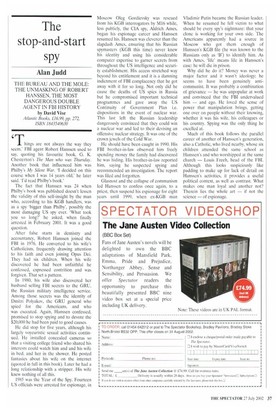The stop-and-start spy
Alan Judd
THE BUREAU AND THE MOLE: THE UNMASKING OF ROBERT HANSSEN, THE MOST DANGEROUS DOUBLE AGENT IN FBI HISTORY by David Vise Atlantic Books, .06.99, pp. 272, ISBN 1843540630 Things are not always the way they seem,' FBI agent Robert Hanssen used to say, quoting his favourite book, G. K. Chesterton's The Man who was Thursday. Another book that influenced him was Philby's My Silent War. 'I decided on this course when I was 14 years old,' he later said. 'I'd read Philby's book.'
The fact that Hanssen was 24 when Philby's book was published doesn't lessen the validity of this self-insight by the man who, according to his KGB handlers, was as a spy 'bigger than Philby', possibly the most damaging US spy ever. 'What took you so long?' he asked, when finally arrested in February 2001. It was a good question.
After false starts in dentistry and accountancy, Robert Hanssen joined the FBI in 1976. He converted to his wife's Catholicism, frequently drawing attention to his faith and even joining Opus Dei. They had six children. When his wife discovered he had been unfaithful he confessed, expressed contrition and was forgiven. That set a pattern.
In 1980, his wife also discovered her husband selling FBI secrets to the GRU, the Russian military intelligence service. Among those secrets was the identity of Dmitri Polyakov, the GRU general who spied for the Americans, and who was executed. Again, Hanssen confessed, promised to stop spying and to devote the $20,000 he had been paid to good causes.
He did stop for five years, although his largely voyeuristic sexual activities continued. He installed concealed cameras so that a visiting college friend who shared his interests could watch him and and his wife in bed, and her in the shower. He posted fantasies about his wife on the internet (quoted in full in this book). Later he had a long relationship with a stripper. His wife knew nothing of all this.
1985 was the Year of the Spy. Fourteen US officials were arrested for espionage, in Moscow Oleg Gordievsky was rescued from his KGB interrogators by M16 while, less publicly, the CIA spy, Aldrich Ames, began his espionage career and Hanssen resumed his. Hanssen was cleverer than the slapdash Ames, ensuring that his Russian spymasters (KGB this time) never knew his identity and using his considerable computer expertise to garner secrets from throughout the US intelligence and security establishment His access stretched way beyond his entitlement and it is a damning indictment of FBI complacency that he got away with it for so long. Not only did he cause the deaths of US spies in Russia but he compromised important technical programmes and gave away the US Continuity of Government Plan i.e. dispositions in the event of nuclear war. This last left the Russian leadership dangerously convinced that they could win a nuclear war and led to their devising an offensive nuclear strategy. It was one of the crown jewels of the Cold War.
He should have been caught in 1990. His FBI brother-in-law observed him freely spending money the family had discovered he was hiding. His brother-in-law reported him, saying he suspected spying and recommended an investigation. The report was filed and forgotten.
Glasnost and the collapse of communism led Hanssen to confess once again, to a priest, then suspend his espionage for eight years until 1999, when ex-KGB man Vladimir Putin became the Russian leader. When he resumed he fell victim to what should be every spy's nightmare: that your clone is working for your own side. The Americans apparently had a source in Moscow who got them enough of Hanssen's KGB file (he was known to the Russians only as 'B') to identify him. As with Ames, 'life' means life in Hanssen's case: he will die in prison.
Why did he do it? Money was never a major factor and it wasn't ideology; he seems to have been genuinely anticommunist. It was probably a combination of grievance — he was unpopular at work and convinced that the FBI undervalued him — and ego. He loved the sense of power that manipulation brings, getting one over on people without their knowing, whether it was his wife, his colleagues or his country. Spying was the only thing he excelled at.
Much of this hook follows the parallel career of another of Hanssen's generation, also a Catholic, who lived nearby, whose six children attended the same school as Hanssen's and who worshipped at the same church — Louis Freeh, head of the FBI. Although this looks suspiciously like padding to make up for lack of detail on Hanssen's activities, it provides a useful political context, as well as contrast. What makes one man loyal and another not? Therein lies the whole art — if not the science — of espionage.
































































 Previous page
Previous page